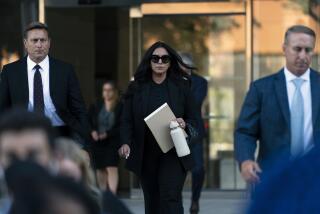Excerpts: North Wanted ‘Top Boss’ to See Base Photos
- Share via
\o7 WASHINGTON\f7 — Following are excerpts from testimony Wednesday of retired Air Force Col. Robert C. Dutton on his involvement with an air resupply effort for the contras directed by retired Gen. Richard V. Secord and Lt. Col. Oliver L. North:
(Dutton was asked by House Deputy Counsel Ken Ballen about a photographic album of secret bases in Central America that he prepared for North.)
Question: And why did you prepare this photograph album?
Answer: I thought it was very direct evidence of what was there. I thought it might be beneficial if Col. North wanted to show it to the people he was working with to say, “Here’s an--here’s the asset, and here’s what it looks like,” not just written messages.
(Asked what he did with the album after he prepared it, Dutton said he had shown it to North and Secord at “our offices” in Virginia.)
A: . . . Gen. Secord looked through it. He liked it. Col. North . . . liked it very much, and said he would like to take it and show it to his top boss.
(Ballen asked Dutton whom he understood North to be referring to.)
A: I understood he was talking about the President.
Q: And why did you understand that? How did you come to that understanding?
A: I’d never heard him use the term talking about anybody else that he had been working with as a top boss.
(Ballen asked Dutton who had provided information about the contra forces to North from within Central America.)
A: The contact that we had for the southern force was what turned out later to be the chief of station, CIA, for that country. I only knew him as Joe. He transmitted a number of messages, both to Col. North and to Raphael Quintero, who was working with me. . . . And one of them was a very desperate plea for help; in fact, claiming that we were playing with their lives. I mean, this is the way the troops felt, when, in fact, we were flying down there trying to find them to make drops to them, and we just couldn’t find them at night.
(Later, a question from Ballen about a refueling of a C-7 mission elicited further reference to the Costa Rican CIA station chief, known in testimony as Joe.
A: . . . We would make arrangements with Joe to contact the force that we were to drop to. We would get instructions back that they would have three bonfires; in some cases they would even give us a pattern that they were going to be laid out in.
(Ballen questioned Dutton about disposal of assets, or profits, of approximately $4.89 million.)
A: My understanding is, the assets were bought out of a fund, and whatever that money came out of, that’s where the money was going to go back to be able to conduct other special operations.
(Ballen asked Dutton if Secord or North had discussed options for disposal of those assets.)
A: . . . Actually, we discussed a number of options. One, of course, was that we may not have had any control over, and that’s if the CIA came in and said: “Get out of town. You know we don’t want you, and you figure out what you want to do with your assets on your own.” The other one was that the assets would be given to the CIA. . . .
Q: And what was Gen. Secord’s view as to who the assets belonged to?
A: Gen. Secord’s view was that the assets belonged to a private corporation. They were being used to aid the contras.
(Later, Dutton was asked by Sen. Paul S. Sarbanes (D-Md.) about the profit margin of the operation in which Dutton , Secord and North were involved.)
A: Sir, in there, I’m not disagreeing with the fact that there was a built-in amount that would be considered a profit. I think in any condition where a proprietary is hired, that there is an expected profit to be made by them.
Q: It would be a substantial profit too, would it not?
A: It would depend on how the operation ran. . . .
(Sarbanes asked Dutton about the involvement of CIA station chiefs in his operation in Central America.)
A: . . . One of the station chiefs supported us directly and very strongly throughout the entire--and as I say, we’re talking about four to five months of operation--but he was of great assistance to us all the time. In one of the neighboring countries, the station chief was called upon to assist us and at times would, and at times would not. . . .
Q: The ambassadors?
A: I heard them mentioned, sir, but if they were involved, if I had a problem in the local area and if I were to call Col. North with it, it would seem to get resolved. I don’t know how it could have gotten resolved without the ambassadors being part of it.
More to Read
Sign up for Essential California
The most important California stories and recommendations in your inbox every morning.
You may occasionally receive promotional content from the Los Angeles Times.










